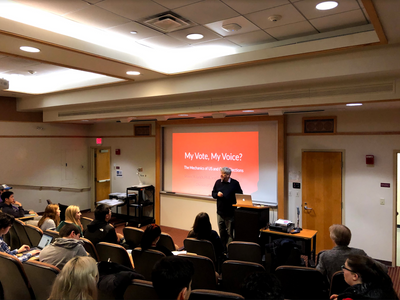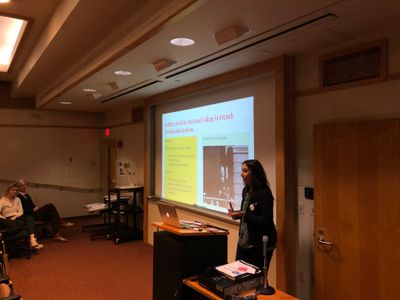BU Votes lecture highlights importance of every voter
A full house came together in the College of General Studies on Feb. 3 to hear about the impact young voters can have on the upcoming 2020 election from College of General Studies faculty members Shawn Lynch and Daniela Melo.
“Today is the day we begin the 2020 election,” Lynch said.
While both lecturers discussed the impending election in their talk titled, “My Voice, My Vote,” Lynch focused his argument on issues within the Constitution that made voting a complicated process.

He began by discussing what he sees as the inherent issue with the design of the Senate, with two senators representing each state.
“One senator in North Dakota represents 760,000 while one senator in California represents 2 million,” Lynch said. “That is not fair; it shows a fundamental problem of representation.”
Lynch continued to explain how 18 percent of the Senate is controlled by “26 of the smallest states in America in terms of population.”
Students reacted to this argument by searching party maps on their laptops and looking up populations.
He then continued to explain how party politics has complicated gerrymandering, the division of the U.S. map into partisan electoral districts.
“The founding fathers were naive in thinking that there would be no party system,” Lynch said.
Gerrymandering had its origins in 1788 when former Virginia governor Patrick Henry redrew the fifth Congressional district’s lines to force political foe James Madison to run against James Monroe, who Henry knew would win, according to the Atlantic.
This system played into the hands of party politicians and allowed them to manipulate the electoral map in order to get votes.
This system took a right away from all Americans without their knowledge, Lynch said.
“Something people fail to understand is that the American people no longer elect the president,” he said.
He said the only way gerrymandering can be overcome is extremely high voter turnout. To him, that is a start to having better representation in the upcoming election.
Melo continued this argument by bringing up what she calls “the French case.” She explains the French system of voting to students and showed how, unlike America’s president, France believes in the concept of “semi-presidential powers.”
“Semi-presidential gives you the idea that he is not as strong as POTUS, but in fact, he is one of the strongest leaders in Europe,” Melo said.

She stressed how the French system is built on the philosophy of equal representation so that the values shared among the people are included within their political system.
Melo highlighted the main difference between the American and French systems by explaining the mentality behind voters in France.
“This [French] system has created a mentality of voting with the heart and having a voice,” she said.
The lecture was sponsored by BU Votes, a university-wide initiative with roots in CGS that encourages students across the university to vote.
— Story and Photos by Kirthana Iyer